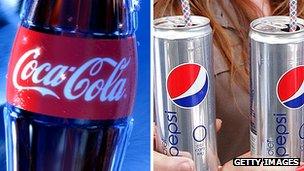Coke and Pepsi change manufacturing process to avoid cancer warning
- Published

Coca-Cola and PepsiCo account for nearly 90% of the US fizzy drink market
Coca-Cola and Pepsi are changing how they make an ingredient in their drinks to avoid being legally obliged to put a cancer warning label on the bottle.
The new recipe for caramel colouring in the drinks has less 4-methylimidazole (4-MEI) - a chemical which California has added to its list of carcinogens.
The change to the recipe has already been introduced in California but will be rolled out across the US.
Coca-Cola says there is no health risk to justify the change.
'No risk'
Spokeswoman Diana Garza-Ciarlante told the Associated Press news agency they wanted to ensure their products "would not be subject to the requirement of a scientifically unfounded warning".
The chemical has been linked to cancer in mice and rats, according to one study, but there is no evidence that it poses a health risk to humans, said the American Beverage Association, which represents the wider industry.
The US Food and Drug Administration (FDA) claims a person would need to drink more than 1,000 cans of Coke or Pepsi a day to take in the same dose of the chemical that was given to the animals in the lab test.
Coca-Cola and PepsiCo account for nearly 90% of the US fizzy drink market, according to one industry tracker, Beverage Digest.
The companies say changing their recipes across the whole of the US, not just in California, makes the drinks more efficient to manufacture.
In a statement Coca-Cola added that the manufacturing process across Europe would not change.
It said that apart from California "not one single regulatory agency around the world considers the exposure of the public to 4-MEI as present in caramels as an issue".
Correction: This story has been amended to make it clear that it was a manufacturing process that had changed, not the recipe of the drinks themselves.